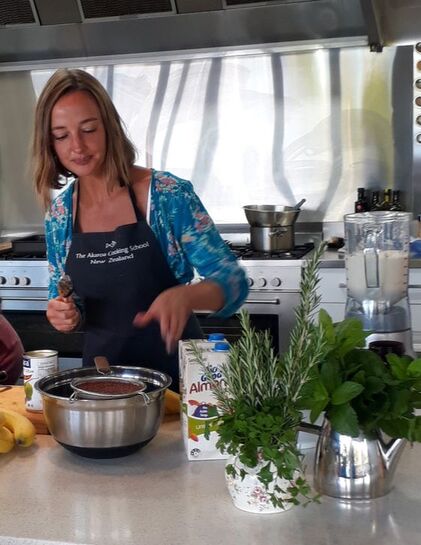 November 1, 2010 "Since I started drinking the herbal liver tea, cut out caffeine and started taking flaxseed oil with protein foods, I have felt more energetic, calmer, and I fall asleep much easier and wake feeling great. And I don’t feel like crap if I do have to get up early. My stomach is now flat and I feel slimmer. I still have OCD thoughts, but not for quite as long as I did previously, and not as intensely." The paragraph above is from an email I sent my Naturopath in the first month I began working on my OCD recovery (November 2010). I’m Francesca Eldridge, and I lived with moderate to severe OCD for 20 years. It eventually became so debilitating that leaving my house became a struggle. After finally deciding enough was enough and committing to working on all aspects of my mental and physical health in my early 30s, I experienced 80–90% reduction in my symptoms of OCD. Nutrition was one of the tools that helped most. This led to me studying to become a nutritionist, and eventually writing my ebook, Nutrition for Your OCD Recovery. It’s available in Kindle and pdf formats here. The previous two articles in The OCD series looked at how protein and nourishing fats support your nervous system and mental health. This article will discuss the importance of ensuring your body can digest and use those fats. Get to know your liver
The liver is part of your digestive system and is located on the right-hand side of your upper abdomen just behind and below your ribs. The liver carries out many life-sustaining roles in our body; this article will focus on your liver’s role in helping digest fats – because specific types of fats are integral to your brain structure, nervous structure, cell structure, and good mental health. Your liver makes bile, a ‘digestive juice’ that is then stored in the gallbladder. Bile helps break down structurally long fats found in meats, fish, eggs and plant oils into small droplets. Pancreatic lipase then acts on the surface of these smaller droplets to break them down further, making them small enough to be absorbed by the cells of the small intestine. Without sufficient bile, these fats aren't going to be well absorbed and used by your body. In this way, your liver plays an important role in your mental health – because your nervous system requires fats for structure and function: -cholesterol and omega 3 for your myelin sheathing -omega 3 DHA for your brain -omega 3 EPA and DHA to reduce inflammation and support neural repair, and -saturated fats for all your cellular membranes. Your liver helps process all these different types of fats into a form your body can use. So a key focus of my recovery from OCD was what I call Liver Love. To support my liver, I took a herbal formula to support liver function, ate more bitter vegetables like asparagus, courgette/zucchini, radicchio, artichokes, and rocket to stimulate bile flow, and drank more water. Plus, the increased protein in my diet (read more about that here) supported my liver’s detox pathways because the amino acids in protein foods are required for phase I and phase II liver detoxification (illustrating that those protein-free 'juice cleanses' can't truly support your body's natural detoxification processes). And the removal of caffeine from my daily life (I’ll share more about this in a future article) reduced the load on my liver’s detox pathways. This meant my liver was able to function better in all its roles, including fat digestion. Quite simply: eating more nourishing fats that feed your nervous system + supporting your liver in digesting these fats = better mental health. There are further steps that can be taken to support the function of your liver (and pancreas) to support fat digestion and mental health. Which steps are most relevant and helpful to you as an individual will depend on a number of factors such as your diet and lifestyle (e.g., smoker? drinker? history of MDMA or other recreational drug use? lack of antioxidant foods in your diet?), and health history (e.g., medication use, exposure to environmental toxins, surgical removal of your gallbladder). With commitment to nutrition and lifestyle changes over 15 months, I experienced 90% reduction in my OCD. And some lovely side benefits of supporting my liver that came much sooner were no more PMS (the liver breaks down unneeded hormones), acne, or migraines. It got to the point where I started tracking my period dates, otherwise I’d have no idea when it was coming! No more painful cramps, increased anxiety or painful breasts. And I sure don’t miss the feeling-stabbed-through-the-back-of-my-eyeballs-then-vomiting migraines I used to get several times a year. If you’d like to learn more about how nutrition can support your OCD recovery, check out my ebook - it's the world's first evidence-based guide to Nutrition for Your OCD Recovery.
0 Comments
Leave a Reply. |